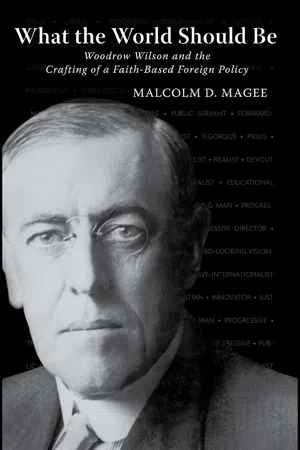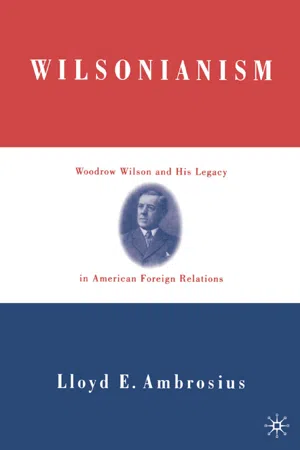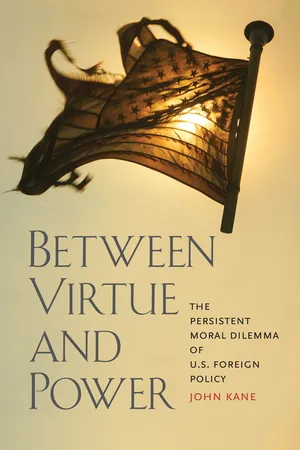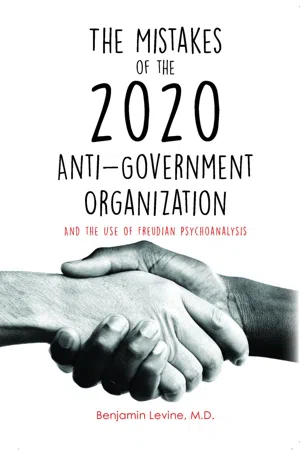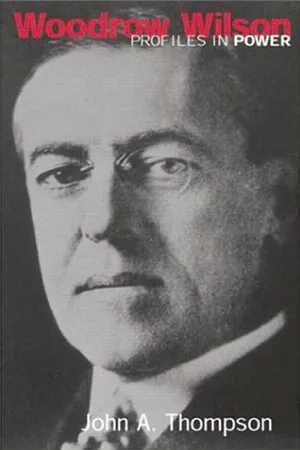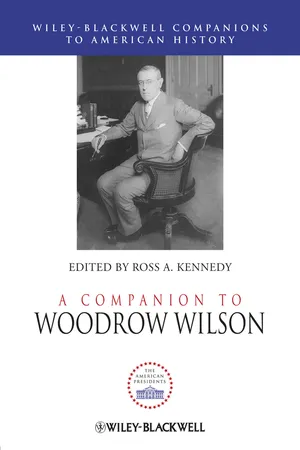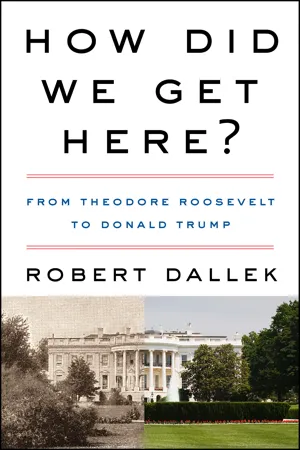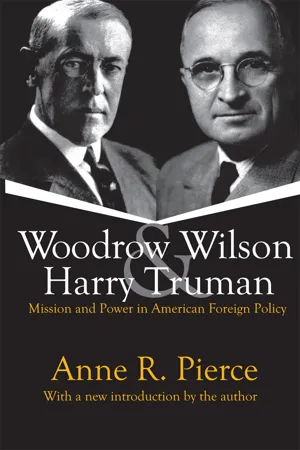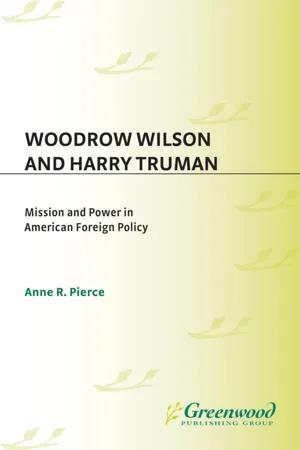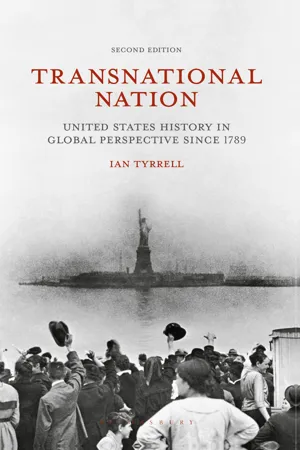History
Woodrow Wilson
Woodrow Wilson was the 28th President of the United States, serving from 1913 to 1921. He is known for his leadership during World War I and for his efforts to establish the League of Nations, a precursor to the United Nations. Wilson's progressive domestic policies included the creation of the Federal Reserve System and the implementation of antitrust laws.
Written by Perlego with AI-assistance
Related key terms
1 of 5
11 Key excerpts on "Woodrow Wilson"
- eBook - PDF
What the World Should Be
Woodrow Wilson and the Crafting of a Faith-Based Foreign Policy
- Malcolm D. Magee(Author)
- 2011(Publication Date)
- Baylor University Press(Publisher)
. . . America has promised her-self and promised the world this great heritage. Shall she break the promise?” 96 While Wilson lacked experience or specific proposals that he could bring to American international relations, he had a deeply held set of beliefs and a comprehensive philosophy regarding how America should relate to the other nations of the world. He knew what his role should be as leader of the nation and had developed a comprehen-sive way of thinking, of balancing antinomies in order to discern the central providential plan. The evidence that he rooted his method of thought in a religious understanding of the world and the progressive millennial views dominant at the time is overwhelming. March 4, 1913, came to a close. The chief justice had adminis-tered the oath of office. Dignitaries had given speeches. The Princeton undergraduates who had escorted the president elect to the capitol were now dispersed. Woodrow Wilson, the twenty-eighth president of the United States, sat that evening in the White House. His election victory had convinced him of the reality of the divine calling that he Development of Woodrow Wilson’s Thought to 1913 39 had sensed throughout his adult life. He would work hard and do his duty to bring God’s order to the nation and to the world. The nation was ready. The people had given him God’s authority and their own with a constitutional election victory. The world would have to wait until some cataclysmic event signaled that its time had also come. This page intentionally left blank - eBook - PDF
Wilsonianism
Woodrow Wilson and His Legacy in American Foreign Relations
- L. Ambrosius(Author)
- 2002(Publication Date)
- Palgrave Macmillan(Publisher)
73-100. Reprinted by permission of Univcr!;ity Press of Amcrica. One central theme eharacterized President Woodrow Wilso n's leadership in world affairs. He consistendy endeavored (0 establish his control over American fore ign relations. Seeking to dominate the policy-making process in the United States and to project Ameriean influen ee into other eountrics, he intend ed 10 use the full powers of the presideney. This search for eomrol at horne and abroad occurred withi n the co ntext of a ehanging nation and a revolutionary world. Science an d technology had enabled Amerieans (0 develop indusrry and build eities. Transforming the pe rsonal relation- sh ips of uaditional ru ral commun iries into a bureaucratic pattern, indus tr ialization and urbanization created a modern corporate or organizational soeiery in the United Srates. These profound soe ial and economic changes neeessitatcd a new ro le for the American government in both domeStic and foreig n affairs. What American democraey required, according ro W ilson, was "progressive Like olher progressives, he hoped ro avert uncomrollable chaos or anarchy by rnanaging orderly change. The maintenance of the StatuS quo no longer appeared feasibl e to hi rn either in the United States or abroad. As a ryp ical American progres- sive, he preferred reform (0 revolution. This preference shaped his attitude toward revolutions in other countries. He weleomed moderate eha nges, especially when these resulted in greater American influence, bur opposcd radieal revo lurion . In short, under Wi lson's leadership the United Stares searehed for ady namie form of control, not merely for order.! Wilson experienced the fu ndamental dilemma facing Ameriean policymakers in the twemieth century. On one side, the world's growing interdependence prevented the Uniled States from ignoring events in other places. Apparently remote devdop- ments, sueh as Those leading ro the outbreak of the European wa r in 1914, eventually involved The United STates. On the other side, the continuing - eBook - PDF
Between Virtue and Power
The Persistent Moral Dilemma of U.S. Foreign Policy
- D. W. Mertz(Author)
- 2008(Publication Date)
- Yale University Press(Publisher)
144 chapter nine Woodrow Wilson and the Reign of Virtue in the cour se of a few hectic years, the presidency had passed from warrior to lawyer to priest. Wilson’s presidency marked the ascen-dancy of innocent virtue in U.S. foreign policy, which he promised to make “selfless” and exemplary. No exercise of American power would be allowed to offend innocent virtue on his watch. Yet Wilson was unable to keep his promises. He intervened violently in Latin American politics whose turbulence was in some degree a result of America’s own policy, drawn partly by the expansionist logic established by McKinley and partly by his own obstinate moralism. He would commit the nation to participation in a cruel war in Europe, justifying it as a war to end all wars, the prelude to building world peace through general dis-armament, arbitration, and a system of international law expressed in and safeguarded by a League of Nations. That this project to fulfill the national mission ended in resounding failure was in large part due to Wilson’s in-ability to transcend the too-simple antithesis of virtue and power that his worldview assumed and the American mythology encouraged. This important episode is the subject of the present chapter, but to begin we must look at how Wilson conceived of American nationalism and the vital American mission. These played a large part in his concep-tion of his task in pursuing the reign of perpetual peace. The tenor of his thinking on America and its special exemplary role can be gauged from Woodrow Wilson and the reign of virtue 145 a famous speech he made in 1915 to explain why the United States should not become involved in the Great War in Europe. My urgent advice to you would be, not only always to think first of America, but always, also, to think first of humanity. . . . Americans must have a consciousness different from the con-sciousness of every other nation in the world. - eBook - ePub
The Mistakes of the 2020 Anti-Government Organization
And the Use of Freudian Psychoanalysis
- Benjamin Levine(Author)
- 2020(Publication Date)
- Palmetto Publishing(Publisher)
The 28th President Woodrow Wilson (1856-1924)(1912-1920)W ilson’s father published a pro-tariff and anti-slavery newspaper in Ohio. The family moved to the South in 1851 where his father, Joseph Wilson, owned slaves. At the age of three Woodrow Wilson remembers Abraham Lincoln becoming president and the talk of war. Wilson did not begin to read until age 10 due to dyslexia. But, he achieved academically with hard work and discipline. After a year at Davidson College he transferred as a first year student to the New Jersey College that became Princeton University where he studied political philosophy and history. In the 1876 contested presidential election Wilson supported Sam Tilden, but Rutherford Hayes was granted president by the electoral commission. After study at the University of Virginia Law School, he attended graduate school at Johns Hopkins University in 1883 where he received a doctorate in 1886 in political science and history. He also studied German and economics. In 1890 he was elected to be chairman of Jurisprudence and Political Economy. He took a six-week course in administration at Johns Hopkins. He taught Constitutional Law at New York Law School.Wilson considered the United States Constitution to be cumbersome and open to corruption. He favored a parliamentary system. “Congressional Government”, his first book advocated a parliamentary system. Wilson believed the system of checks and balances complicated the government. Wilson criticized the House of Representatives believing that the 47 states had a Standing Committee, which he called petty barons who “may at will exercise an almost despotic sway within their own shires, and may at times threaten to convulse even the realm itself.” Wilson believed there is no danger in power, as long as it is not irresponsible. He stated that if power is divided or dealt out to share by many, it is obscured. Wilson said that the presidency will be as big and as influential as the man who occupies it. Some uneducated persons may call such power a dictatorship, but it is not a dictatorship. It is a strong executive government that will lead the nation to growth, leadership and protection. He used the growth of Prussia, England and France as examples of public administration where the executive increased government efficiency. Wilson believed the administration lied outside the spheres of politics so that party differences would not interfere. He contended that the items of administration must be limited, as to not block, nullify, obfuscate or modify a decree of government made by the executive branch. - eBook - ePub
- John A. Thompson(Author)
- 2015(Publication Date)
- Routledge(Publisher)
28These various images of Wilson differ not only in whether they present him in a favorable or unfavorable light, but also in the extent to which they portray his policies and programs as expressive of his personal temperament and idealism rather than simply as representative – whether of general American attitudes and ideas or of the values and interests of a ruling capitalist class in particular. However, they share the assumption that Wilson’s actions and utterances arose directly from his beliefs, with the implicit corollary that attempts to explain them should focus on his own intellectual formation. The fact that Wilson was an academic until he entered politics at the age of fifty-three seems to have strengthened this assumption. He was by no means a business man or an ordinary party politician’, Keynes noted. ‘After all, he had spent much of his life at a university.’29 For many, this led naturally to the conclusion that Wilson was, in the phrase Margaret Thatcher used as a proud self-description, a ‘conviction politician’. Yet there has always been an alternative view – one deeply held by some of Wilson’s contemporary political opponents. This was that, as a practicing politician, he traveled with very little ideological baggage, adopting and abandoning positions as they suited his political interests at the time, and deftly using his exceptional rhetorical ability to cover his tracks. ‘I think he would sacrifice any opinion at any moment for his own benefit and go back on it the next moment if he thought returning to it would be profitable’, Henry Cabot Lodge wrote in 1912, long before his bitter disagreements with Wilson over the First World War and the League of Nations.30 Nor was it only those who opposed his policies who doubted whether Wilson was moved by simple conviction. Lord Robert Cecil, the most devoted supporter of the idea of a league of nations in the British government, noted in his diary after some meetings with the President: ‘He supports idealistic causes without being in the least an idealist himself, at least so I guess, though perhaps I misjudge him.’31 - eBook - ePub
- Ross A. Kennedy(Author)
- 2013(Publication Date)
- Wiley-Blackwell(Publisher)
As the debacle of the treaty fight demonstrated, Wilson’s many victories in Congress had a great deal to do with the strong public support that existed for his policies and programs. The beginning of his presidency in 1913 marked the highpoint of national progressivism, made manifest in the results of the election of 1912, which he transformed into a series of legislative accomplishments that, as Cooper has written, “are well known and acknowledged even by Wilson’s severest critics” (Cooper 2008: 11). The progressive “tailwind” only provided the potential for significant legislation, however; Wilson’s vision of the presidency and his exercise of political leadership over both the Democratic Party and Congress transformed the reform agenda into federal law. The ideas that Wilson had developed over a lifetime of study about the power of the presidency and the singular role of the president in guiding national affairs became a fixture of American political life during his administration. The important reforms of the New Freedom were, in the final analysis, less significant than Wilson’s long-term expansion of the role of the President as the dominant force in national politics. Although weaker leaders beginning with Warren G. Harding would soon be elected to the office, it was evident that, as Arthur Macmahon has written, “never again could the Presidency shrink enough to fit a lesser man” (Macmahon 1958: 122).Although there exists a substantial base of solid research on Wilson as Chief Executive, some aspects of the topic could benefit from additional study. An in-depth treatment of Wilson’s cabinet might shed light on its role in decisionmaking during his presidency; it might also help to answer lingering questions about the administration’s handling of race relations. Another useful undertaking would be a book-length study focusing on Wilson as a Congressional leader that could provide additional insight into why Wilson’s innovative approaches to Congress worked so well before 1917 and increasingly failed after the United States entered World War I. Similarly, a comprehensive study of Wilson’s relations with military leaders, both before and after 1917, might add another dimension to our understanding of Wilson as Chief Executive.REFERENCESAuchincloss, L. (2000) Woodrow Wilson: A Penguin Life . New York: Viking.Baker, R.S. (1916) “Wilson.” Collier’s LVIII: 6.Baker, R.S. (1931) Woodrow Wilson Life and Letters: Volume 4: President 1913–1914 - eBook - ePub
How Did We Get Here?
From Theodore Roosevelt to Donald Trump
- Robert Dallek(Author)
- 2020(Publication Date)
- Harper(Publisher)
Wilson, like so many other presidents, craved power not only because it gave him a sense of superiority but also because it gave him the chance to improve America and the world. In their campaigns, other presidents used high-minded rhetoric to bond with their audiences, but it was unclear exactly how they intended to move the country forward. By contrast, Wilson had a clear vision of how he hoped to advance the nation’s standing at home and abroad.He believed that a more humane society was vital in enhancing the nation’s greatness and international appeal. It continued what Roosevelt had initiated and set a high standard for future presidents. Still, Wilson began his presidency with few convictions about American contributions to international affairs beyond promoting a more principled world, saying, “It would be an irony of fate if my administration had to deal chiefly with foreign problems, for all my preparation has been in domestic matters.” He made his limited schooling in foreign relations apparent when he selected William Jennings Bryan as secretary of state. Bryan’s parochialism and ignorance of European geography in particular registered on Lewis Einstein, the U.S. envoy in Constantinople in 1908. When he wished Bryan, who was on a tour of the Continent, a good trip through the Balkans, the seeding ground for World War I, Bryan asked, “The Balkans, what are they?” Einstein saw Bryan’s response as astonishing provincialism. Ultimately, Wilson would settle on an agenda for reforming the world community, animating his actions in international affairs as they had in domestic matters by saying “that questions of government are moral questions.” While Wilson proved to be an exceptionally able politician who could use rhetoric as a not always reliable political tool, he held the conviction that “we must believe the things we tell the children.” - eBook - ePub
Woodrow Wilson and Harry Truman
Mission and Power in American Foreign Policy
- Anne Pierce(Author)
- 2017(Publication Date)
- Routledge(Publisher)
Part I Woodrow WilsonPassage contains an image
Chapter 1 The Invigoration of Principles and the Assertion of Power: A New President Takes ChargeNowhere else in the world have noble men and women exhibited in more striking forms the beauty and the energy of sympathy and helpfulness and counsel in their efforts to rectify wrong, alleviate suffering, and set the weak in the way of strength and hope. We have built up, moreover, a great system of government, which has stood through a long age as in many respects a model for those who seek to set liberty upon foundations that will endure against fortuitous change, against storm and accident. Our life contains every great thing and contains it in great abundance .... But the evil has come with the good and much fine gold has been corroded .... We see the bad with the good, the debased and decadent with the sound and vital. With this vision we approach new affairs. Our duty is to cleanse, to reconsider, to restore, to correct the evil without impairing the good, to purify and humanize every process of our common life without weakening or sentimentalizing it.(Inaugural Address, March 4, 1913)Twentieth-century politics acquires part of its meaning and definition from the politics of Woodrow Wilson. With a vengeance, he tackled the vexing problems of his time. With the finesse of a scholar attuned to the world around him, he articulated the yearnings of mankind and created an ideological framework for examining the issues of the day. He came to power at a time when the United States and the world needed new direction and new ideas. His perception of the need for change inspired him to alter the way America's power would be used and to adapt the idea of America's mission to his goals. Although some of the changes he wrought were dramatic and radical, others marked the invigoration and regeneration of traditional American principles.Wilson's approach to American politics was creative, energetic and resourceful, but nevertheless careful and reverent. His study of history prevented him from being blindly appropriated by the presuppositions of the past while at the same time reminding him of that which is noble in it. His religious-philosophical belief in the individual will and in the accountability and responsibility of each individual toward God and mankind inspired him to go beyond history—but only insofar as an untried path seemed to him to contain the distinct possibility of improvement over that already tried and proven. His optimism regarding the future was tempered by his respect for his ideological, theological and political predecessors. - eBook - PDF
Statecraft and Salvation
Wilsonian Liberal Internationalism as Secularized Eschatology
- Milan Babík(Author)
- 2013(Publication Date)
- Baylor University Press(Publisher)
137 CHAPTER FIVE T HE (N OT S O ) C ONSERVATIVE M ILLENNIALIST Woodrow Wilson and History as Orderly Progress Toward Liberty A lready Wilson’s contemporaries realized that he would cast a long shadow over subsequent American statecraft, and they set about mapping his character, ideas, and policies even before his death in 1924. The countless studies that have appeared since then disagree on many points, but an important common thread runs through all of them: the recognition that Wilson’s religious faith played an important role in his domestic and international political thought and practice. The journalist Ray Stannard Baker, who knew Wilson personally and authored his first major biography, insisted that Wilson’s “career can in no wise be under -stood without a clear knowledge of [his] profound religious convictions . . . Religion was never incidental with him; it was central.” 1 In a similar vein, though much more derisively, John Maynard Keynes stated after meeting Wilson at Versailles that “His thought and temperament were essentially theological, not intellectual.” 2 The precepts of American Prot -estant Christianity represented the essential matrix structuring Wilson’s 1 Baker, Woodrow Wilson: Life and Letters (Garden City, N.Y.: Doubleday, 1927– 1939), 1:68. 2 Keynes, The Economic Consequences of the Peace (New York: Harcourt, Brace & Howe, 1920), 38. 138 STATECRAFT AND SALVATION understanding of secular political reality, and he wove Presbyterian cov -enant theology into every facet of existence. 3 Given the centrality of Wilson’s faith to all areas of his life, includ -ing diplomacy, it is curious that contemporary international relations has failed to grasp the role of biblical salvationism in his political utopianism and neglected to interpret his liberal internationalist project as secular -ized eschatology. - eBook - PDF
Woodrow Wilson and Harry Truman
Mission and Power in American Foreign Policy
- Anne Pierce(Author)
- 2003(Publication Date)
- Praeger(Publisher)
In Wilson's mind, such qualities as these compelled Americans not only to defend their polity but also to dispense their rationality. As a powerful democ- racy which also happened to be the most reasonable and restrained of the pow- erful nations, the United States held a unique counterpoise to extremism. This was especially true when the world was submitting to the disastrous conse- quences of its own lack of temperance and restraint. Wilson's belief that the United States stood for the right principles while having the good sense and practical ability to carry them out contributed to his belief that we had to con- sider the problems of others who were less moderate, scrupulous and rational as our own problems. Regarding the League of Nations, Wilson thought it "in- conceivable that the people of the United States should play no great part in that great enterprise." As we became enemy and ally in an explosive and convulsive world war, the problems of others indeed became our own. However, it would prove exceed- ingly difficult to acquire the problems of others as our own without changing 46 Woodrow Wilson the definition of our own. The demands on the United States as a participant in a brutal war made the exhibition of moderation and the application of universal principles difficult, and frequently unwise. During the first year of American participation, we see the ironic intermin- gling of opposites, reflecting the extreme complexity of our position as "benef- icent" Americans who were also "enemies" in a merciless war. We see the attempt to unify the world behind common beliefs and goals intermingling with the divisive portrayal of Germany as the center of all evil. We see the United States as benefactor and redeemer but also as uncompromising destroyer. We see an internationalism based on the dream of world harmony and peace inter- mingling with an unprecedented American association with the divisions of Eu- rope. - eBook - PDF
Transnational Nation
United States History in Global Perspective since 1789
- Ian Tyrrell(Author)
- 2015(Publication Date)
- Red Globe Press(Publisher)
Wilson was determined that American participation should not lead to more of the same old imperialist rivalries. He was a liberal in the nineteenth-century Anglo-American tradition of free trade and moderate reform – his politico-economic views were akin to those of Victorian-era British prime minister W. E. Gladstone. Wilson drew upon these liberal convictions and synthesized them with growing American power and the new world situa-tion of collapsing multinational empires to produce a new diplomacy. The result was the Fourteen Points enunciated on January 8, 1918. Guaranteed freedom of the seas, disarmament, an end to secret treaties, and rights of national self-determination – these were some of the principled demands of the nation’s high-minded president. Noble though the Fourteen Points seemed, very significant in their develop-ment was the threat that Wilson felt from the revolutionary Marxist-inspired Bolshevik Revolution in Russia. He articulated an alternative global vision to revolutionary socialism, one based on liberal individualism. Thus the Fourteen Points should not be seen in isolation. They were a product of the inter-national political conjuncture rather than simply an American-derived idea projected upon the world stage, and they signalled a Realpolitik commitment to American interests. Wilson proposed a new system of international relations that would go beyond imperialism, because he, like Bolshevik leader V. I. Lenin, saw the war as a product of imperialist rivalries. Not for nothing did American The New World Order in the Era of Woodrow Wilson 175 troops take part in the allied invasion of Siberia in 1918 in defence of the White (anti-communist) Russian forces in the Russian Civil War, though the objectives were murky and the outcomes only demonstrated Japanese power in East Asia and the failure of the anti-communist counter-revolution. 6 At the Versailles Peace Conference, Wilson advocated national self-determination for Europe’s peoples.
Index pages curate the most relevant extracts from our library of academic textbooks. They’ve been created using an in-house natural language model (NLM), each adding context and meaning to key research topics.
